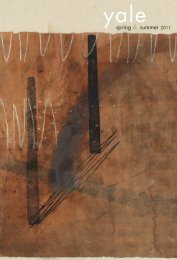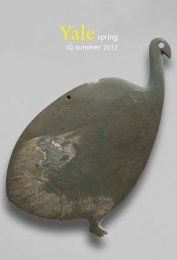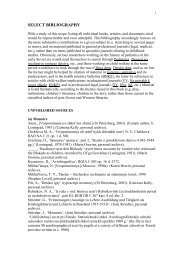View & Download - Yale University Press
View & Download - Yale University Press
View & Download - Yale University Press
Create successful ePaper yourself
Turn your PDF publications into a flip-book with our unique Google optimized e-Paper software.
76 Science, Technology & Health<br />
The Proteus Paradox<br />
How Online Games and Virtual<br />
Worlds Change Us – And How<br />
They Don’t<br />
Nick Yee<br />
Proteus, the mythical sea god who<br />
could alter his appearance at will,<br />
embodies one of the promises of<br />
online games: the ability to reinvent<br />
oneself. Yet inhabitants of virtual<br />
worlds rarely achieve this liberty,<br />
Nick Yee contends. In fact, though online games evoke a sense of<br />
freedom and escapism, careful research demonstrates that<br />
nothing could be farther from the truth. Yee shows that virtual<br />
worlds perpetuate social norms and stereotypes from the offline<br />
world, encouraging racism, misogyny, superstitious thinking and<br />
other malicious attitudes. Further, the author finds that virtual<br />
worlds provide unparalleled – but rarely recognised – tools for<br />
controlling how players think and behave.<br />
Yee breaks down misconceptions about who plays fantasy<br />
games and the extent to which the online and offline worlds<br />
operate separately. With a wealth of entertaining and<br />
provocative examples, he explains in lay terms what virtual<br />
worlds are about and why they matter.<br />
Nick Yee is a senior research scientist at Ubisoft, where he<br />
studies online game player behaviour. He is widely known for<br />
the Daedalus Project, an extensive study of online role playing.<br />
February 256 pp. 210x140mm. 15 b/w illus.<br />
HB ISBN 978-0-300-19099-1 £20.00*<br />
Raising Henry<br />
A Memoir of Motherhood,<br />
Disability, and Discovery<br />
Rachel Adams<br />
Rachel Adams’s life had always gone<br />
to plan. She had an adoring<br />
husband, a two-year-old son, a sunny<br />
Manhattan apartment and a position<br />
at Columbia <strong>University</strong>. Everything<br />
changed with the birth of her second<br />
child, Henry. Just minutes after he<br />
was born, doctors told her that Henry had Down syndrome, and<br />
she knew that her life would never be the same.<br />
In this honest, self-critical and surprisingly funny book, Adams<br />
chronicles the first three years of Henry’s life and her own<br />
transformative experience of unexpectedly becoming the mother<br />
of a disabled child. A highly personal story of one family’s<br />
encounter with disability, Raising Henry is also an insightful<br />
exploration of today’s knotty terrain of social prejudice,<br />
disability policy, genetics, prenatal testing, medical training and<br />
inclusive education. Adams untangles the contradictions of<br />
living in a society that is more enlightened and supportive of<br />
people with disabilities than ever before, yet is racing to perfect<br />
prenatal tests to prevent children like Henry from being born.<br />
Rachel Adams is professor of English and American studies at<br />
Columbia <strong>University</strong>.<br />
October 272 pp. 210x140mm. 1 b/w illus.<br />
HB ISBN 978-0-300-18000-8 £17.99*<br />
Translation rights: Janklow & Nesbitt Associates, New York<br />
The Global War for<br />
Internet Governance<br />
Laura DeNardis<br />
The internet has transformed the<br />
manner in which information is<br />
exchanged and business is<br />
conducted, arguably more than any<br />
other communication development<br />
in the past century. Despite its wide<br />
reach and powerful global influence,<br />
it is a medium uncontrolled by any<br />
one centralised system, organisation or governing body, a<br />
reality that has given rise to all manner of free-speech issues<br />
and cybersecurity concerns. The conflicts surrounding internet<br />
governance are the new spaces where political and economic<br />
power is unfolding in the 21st century.<br />
This study reveals the inner power structure already in place<br />
within the architectures and institutions of Internet<br />
governance. It provides a theoretical framework for internet<br />
governance that takes into account the privatisation of global<br />
power as well as the role of sovereign nations and international<br />
treaties. In addition, DeNardis explores what is at stake in<br />
open global controversies and stresses the responsibility of the<br />
public to actively engage in these debates.<br />
Laura DeNardis is an associate professor in the School of<br />
Communication at American <strong>University</strong>.<br />
February 256 pp. 234x156mm. 9 b/w illus.<br />
HB ISBN 978-0-300-18135-7 £25.00<br />
The Psychoanalytic Study of the Child<br />
Volume 67<br />
Edited by Claudia Lament and Robert A. King<br />
This distinguished annual, containing outstanding original<br />
papers in psychoanalytic theory and practice, brings together<br />
findings from all areas of analytic research and offers a rich<br />
mixture of clinical and theoretical material.<br />
Volume 67, the latest volume in this esteemed series, features<br />
special sections devoted to sibling relationships and to working<br />
with parents of adolescents. Other contributions address the<br />
adolescent’s use of cyberspace to regulate intimacy in<br />
psychotherapy, the evolution of traumatic memories over the<br />
course of development and the role of the other in object<br />
relations models. A section tracing the evolution of child<br />
psychoanalysis includes Anna Freud’s own provocative<br />
commentary titled ‘There Has Never Been Anything Like a<br />
Classical Child Analysis’.<br />
The Psychoanalytic Study of the Child Series<br />
February 288 pp. 234x156mm. 2 b/w illus.<br />
HB ISBN 978-0-300-19585-9 £55.00












